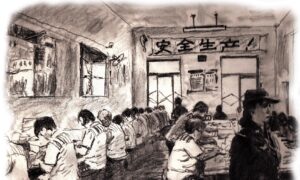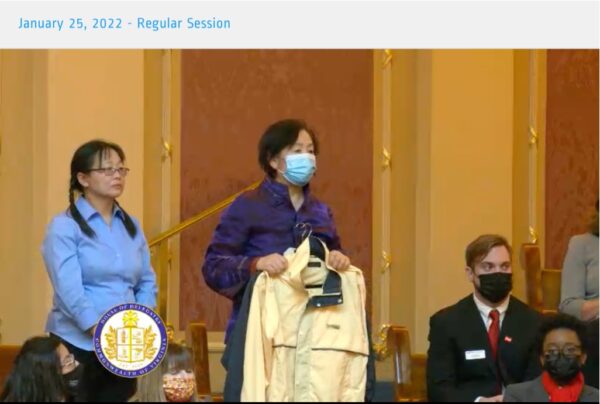CCP’s Slave-Labor Practices Aided by West Turning Blind Eye, Says China Expert
Cotton from Xinjiang has brought to light the notorious concentration camps, forced labor, and the Chinese communist regime’s crime of genocide against Xinjiang’s Uyghur population. However, slave labor has been a feature of the regime’s prisons since the communist revolution ended in 1949, and sporadic reports on the issue have never received enough attention from the rest of the world. China commentator Heng He told The Epoch Times that the huge profits generated by international trade with China have seen the world turn its face away from the Chinese Communist Party’s (CCP’s) inhumane practices—and prolonged the suffering of prisoners. Heng said that China’s systems of slave labor in its “Re-education Through Labor” camps—which are derived from the CCP’s ideology—exhibits the same ideology as the Nazi’s Auschwitz concentration camp motto: “Arbeit macht frei” (Work sets you free). Recently, a number of female survivors of the CCP’s labor camps told The Epoch Times their stories of inhumane prison slavery. 20-Hour Workdays Wang Chunyan, who owned a trading company in China, was imprisoned in 2002 and again in 2007 for practicing Falun Gong, a mind and body practice that has benefited hundreds of millions of followers with its teaching of the universal principles of truthfulness, compassion, and tolerance, and its gentle exercises that include a sitting meditation. The former leader of China’s Communist regime, Jiang Zemin, decided to initiate the persecution of Falun Gong in 1999. Since then, a vast number of Falun Gong adherents have been thrown into jails, forced to perform slave labor, tortured, killed, and even murdered for their organs. Wang told The Epoch Times that on January 9, 2003, she was sent to Liaoning Provincial Women’s Prison, where prisoners were forced to work intensively on producing goods for export. The heavy workload started at six in the morning, and went on until 2 a.m. the next morning. Only five minutes was given for meal times, and each prisoner was given just two small bottles of water—that’s 500 ml of drinking water per day. Wang Chunyan shows the slave labor-produced jacket she smuggled out of Liaoning Women’s Prison in northeastern China when she spoke to members of the Virginia General Assembly during a regular session in Richmond, Va., on Jan. 25, 2022. (Screenshot via The Epoch Times) When the quota wasn’t finished, the prison would cut the prisoners’ meal times. At one point during her incarceration, lunch was skipped for three consecutive days just to meet the plant’s quota, Wang said. The constant overwork and oppressive atmosphere left many inmates suffering from numerous illnesses, she said, such as respiratory diseases, liver problems, eczema, scabies, and various infectious conditions. But the work never stopped, and the products did not go through any sanitary inspection or sterilization. Once she had escaped China for America, she found many familiar items in the supermarket that she had previously encountered in prison. Wang said she believes that much of our lingerie and underwear—often made with fine materials but sold at cheap prices in the United States—are surely made in Chinese prisons. “Many of those [Chinese-made] cotton pants and sweaters sold in Walmart were what we made [in prison],” she said. The fancy wrappers of goods imported from China often hide the most heinous crimes. “There are many stories of blood and tears behind them,” she told the Chinese-language edition of The Epoch Times on March 26. According to reports by Minghui.org, a U.S.-based platform that reports on the CCP’s persecution of Falun Gong in China, Liaoning Women’s Prison produces Chinese police uniforms, as well as uniforms for the Ministry of Public Security, the Ministry of Justice, and some railway departments. In addition, it is also a processing base for China’s export trade, producing a variety of brand-name clothing, down coats, sportswear, and accessories such as handbags. The Epoch Times tried to contact Liaoning Women’s Prison and Liaoning Prison Administrative Bureau, but they had not replied by the time this article was published. Restroom Breaks Twice A Day Another Falun Gong adherent, Lu Mei (a pseudonym), was imprisoned in Liaoning’s Masanjia Re-education Through Labor Camp in 2006, and is now on the run. Lu told the Chinese-language edition of The Epoch Times that when she was imprisoned there, the prison was producing green cotton T-shirts and camouflage uniforms for the Chinese army, as well as Italian brand-name clothes. She said the minimum workload was 12 hours per day. “The food was bad and there was little of it,” she said, adding that she lost all her teeth in prison. The restroom breaks were at 10 a.m. and 3:30 p.m., and the restroom was locked the rest of the time. “[Many people] damaged their kidneys,” she said. More than a dozen of the inmates whom she had met have since died of kidney failure, Lu said. A Falun Gong practitioner

Cotton from Xinjiang has brought to light the notorious concentration camps, forced labor, and the Chinese communist regime’s crime of genocide against Xinjiang’s Uyghur population. However, slave labor has been a feature of the regime’s prisons since the communist revolution ended in 1949, and sporadic reports on the issue have never received enough attention from the rest of the world.
China commentator Heng He told The Epoch Times that the huge profits generated by international trade with China have seen the world turn its face away from the Chinese Communist Party’s (CCP’s) inhumane practices—and prolonged the suffering of prisoners.
Heng said that China’s systems of slave labor in its “Re-education Through Labor” camps—which are derived from the CCP’s ideology—exhibits the same ideology as the Nazi’s Auschwitz concentration camp motto: “Arbeit macht frei” (Work sets you free).
Recently, a number of female survivors of the CCP’s labor camps told The Epoch Times their stories of inhumane prison slavery.
20-Hour Workdays
Wang Chunyan, who owned a trading company in China, was imprisoned in 2002 and again in 2007 for practicing Falun Gong, a mind and body practice that has benefited hundreds of millions of followers with its teaching of the universal principles of truthfulness, compassion, and tolerance, and its gentle exercises that include a sitting meditation.
The former leader of China’s Communist regime, Jiang Zemin, decided to initiate the persecution of Falun Gong in 1999. Since then, a vast number of Falun Gong adherents have been thrown into jails, forced to perform slave labor, tortured, killed, and even murdered for their organs.
Wang told The Epoch Times that on January 9, 2003, she was sent to Liaoning Provincial Women’s Prison, where prisoners were forced to work intensively on producing goods for export.
The heavy workload started at six in the morning, and went on until 2 a.m. the next morning. Only five minutes was given for meal times, and each prisoner was given just two small bottles of water—that’s 500 ml of drinking water per day.

When the quota wasn’t finished, the prison would cut the prisoners’ meal times. At one point during her incarceration, lunch was skipped for three consecutive days just to meet the plant’s quota, Wang said.
The constant overwork and oppressive atmosphere left many inmates suffering from numerous illnesses, she said, such as respiratory diseases, liver problems, eczema, scabies, and various infectious conditions. But the work never stopped, and the products did not go through any sanitary inspection or sterilization.
Once she had escaped China for America, she found many familiar items in the supermarket that she had previously encountered in prison.
Wang said she believes that much of our lingerie and underwear—often made with fine materials but sold at cheap prices in the United States—are surely made in Chinese prisons. “Many of those [Chinese-made] cotton pants and sweaters sold in Walmart were what we made [in prison],” she said.
The fancy wrappers of goods imported from China often hide the most heinous crimes. “There are many stories of blood and tears behind them,” she told the Chinese-language edition of The Epoch Times on March 26.
According to reports by Minghui.org, a U.S.-based platform that reports on the CCP’s persecution of Falun Gong in China, Liaoning Women’s Prison produces Chinese police uniforms, as well as uniforms for the Ministry of Public Security, the Ministry of Justice, and some railway departments. In addition, it is also a processing base for China’s export trade, producing a variety of brand-name clothing, down coats, sportswear, and accessories such as handbags.
The Epoch Times tried to contact Liaoning Women’s Prison and Liaoning Prison Administrative Bureau, but they had not replied by the time this article was published.
Restroom Breaks Twice A Day
Another Falun Gong adherent, Lu Mei (a pseudonym), was imprisoned in Liaoning’s Masanjia Re-education Through Labor Camp in 2006, and is now on the run.
Lu told the Chinese-language edition of The Epoch Times that when she was imprisoned there, the prison was producing green cotton T-shirts and camouflage uniforms for the Chinese army, as well as Italian brand-name clothes.
She said the minimum workload was 12 hours per day. “The food was bad and there was little of it,” she said, adding that she lost all her teeth in prison.
The restroom breaks were at 10 a.m. and 3:30 p.m., and the restroom was locked the rest of the time. “[Many people] damaged their kidneys,” she said.
More than a dozen of the inmates whom she had met have since died of kidney failure, Lu said.

Fake Eyelashes
Tong Fang (a pseudonym) was once imprisoned in Heilongjiang Provincial Women’s Prison.
She said the prison had 14 production areas, of which at least 8 areas were equipped with assembly lines for garments—from cutting to final products.
The clothes came in large batched rolls, she said, and it would take several people to carry each heavy roll. In order to avoid beatings and merely in order to survive, many of the inmates worked through the night just to earn points on their performance score sheets.
The prison also produced accessories such as hairpiece beads, cotton swabs, toothpicks, coffee stirrers, shopping bags, false eyelashes, and so on.
The inmates were overloaded with labor-intensive tasks. When the quota wasn’t met, there was no sleep, no meals, and points deductions.
In one working cell, more than two dozens inmates would be packed in for making false eyelashes, shoulder to shoulder, with no extra room for moving about. Even though it was hot on summer days, the windows and doors were kept shut to make sure the eyelashes wouldn’t blow away on any breeze. Inmates maintained one posture to work, with sweat dripping from their hair. “Our clothes were drenched with sweat … you would often work overnight, and if you couldn’t finish that day, you’d work overtime again the next,” Tong said.
Many of the inmates working on false eyelashes ended up wearing reading glasses in their 30s, according to Tong. “It hurts the eyes, the neck, and many had swollen legs after long hours of work,” she said.
Communist Ideology: Slave Laborers
Commentator Heng He said that in the early years of the CCP’s persecution campaign against Falun Gong, many persecuted adherents exposed the CCP’s use of prisoners for large-scale manufacturing and the export of prison-made products. The U.S. government deliberately ignored the severity of the issues at the time, he said, which made the situation worse.
In 2003 and 2004, the WOIPFG (World Organization to Investigate the Persecution of Falun Gong) reported how the CCP’s prisons and labor camps were exploiting imprisoned Falun Gong adherents in the production of Henan Rebecca Hair Products.
In 2005, journalist Jamil Anderlini of the South China Morning Post also investigated wig manufacturer Henan Rebecca Hair Products, which is listed on the Shanghai stock exchange and is a popular recipient of international investment—including from institutions such as ING, Morgan Stanley, Deutsche Bank, Merrill Lynch, and HSBC, which were among the publicly traded corporation’s top 10 shareholders at that time.
A follow-up investigative report by The Village Voice found that the U.S. government thought it “better to urge China to change while working with it”.
Heng said that the U.S. government’s appeasement policy at that time acted as a green light for Chinese slave-labor products.
The appeasement policy has been popular in the West, and even the forced work of the Xinjiang concentration camp laborers had been ignored until recent years.

A recent case that exposed the CCP’s prisons and forced labor camps for the production of exported goods was in 2012, when Oregon woman Julie Keith found a letter pleading for help in a box of Halloween decorations purchased at Kmart.
The letter stated that “People who work here have to work 15 hours a day without Saturday, Sunday break and any holidays. Otherwise, they will suffer torturement, beat and rude remark. Nearly no payment (10 yuan/1 month).” Ten yuan is equivalent to $1.46.
The letter came from Falun Gong adherent Sun Yi, who had been imprisoned in Masanjia Labor Camp in Shenyang, northeastern China.
The incident was later portrayed in the documentary film “Letter from Masanjia.”
Slave-labor products are the systematic consequences of the CCP’s ideology, Heng said. The forced labor camp was prevalent before the Cultural Revolution, and was designed for reforming prisoners through labor—a key part of communist ideology.
“It’s just like the Nazi’s concentration camps with signs that read, ‘‘Arbeit macht frei’ (work sets you free). They are the same thing,” he said.
Haizhong Ning, Hong Ning, Luo Ya, and Gu Xiaohua contributed to this report.












